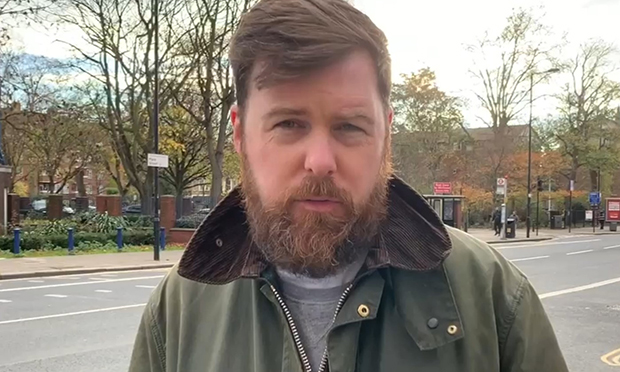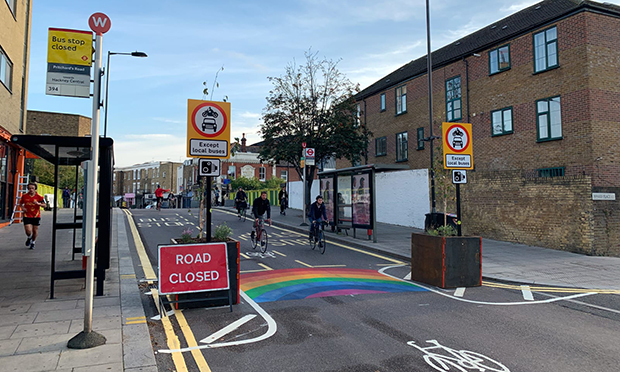LTNs ‘send important signal’ to City Hall on tackling main road congestion, says transport chief

Hackney Council’s transport chief has said that the imposition of Low Traffic Neighbourhoods (LTNs) “send an important signal” to City Hall on the need for the delivery of “radical solutions” to tackle congestion on London’s main roads.
The Town Hall announced four days ago that the introduction of the borough’s three LTNs in Hoxton West, London Fields and Hackney Downs have not caused a rise in traffic levels at its monitoring sites on five A- and B- roads, according to Transport for London (TfL) data.
Nevertheless, Cllr Jon Burke has argued that, in discouraging motor vehicles from travelling through residential neighbourhoods, the council is sending a message to London Mayor Sadiq Khan about the need to tackle congestion on main roads, and suggested road user pricing as one option.
Burke said: “It’s clear to me that LTNs are an important tool in ensuring that an overloaded main road network does not continue to be tolerated by policy makers. Our neighbourhoods have become pressure release valves for the main road network.
“We will no longer allow Silicon Valley billionaires to monetise the value of our residential roads by sending through-traffic along them which they were not designed to accommodate. A consequence is that a significant change to the way drivers now get around the streets of our borough.
“I do not believe that in the long run that the residents of main roads will be benefited in any way by continuing to allow a free-for-all in our residential roads. In the end they will all fill up, to the disadvantage of blue badge holders, the businesses and emergency service vehicles that need to be on our roads.”
Burke was speaking at an influential commission set up to scrutinise skills, economy and growth in the borough, at which chair Cllr Mete Coban accepted that those on the committee were broadly in support of the policies, which have generated much debate in the community.

Despite voicing his own support for the schemes, Cllr Coban grilled both Burke and council officers on the impact of LTNs as well as how they have been rolled out through the use of experimental traffic orders (ETOs), which see consultation undertaken concurrently with residents rather than beforehand.
Coban said: “We haven’t had a proper consultation on this before the scheme was rolled out, so what I’m hearing from a lot from residents is, ‘Has Hackney Council already made up its mind?’
“Are we just doing the consultation because we have to do that to roll out a policy, or are we meaningfully trying to listen, and there are areas where we are looking to improve it and make sure it’s working for local businesses and for people?”
Under ETOs, schemes such as LTNs can be in place for 18 months before a final decision is made, with consultation underway both through the council’s Commonplace site or via email.
The Town Hall is also undertaking continuous traffic count through the locators TfL has in the borough, according to officers, though Burke hit out at those who have vandalised the counters in recent weeks, with the councillor declaring his intent in the past few days to write to the Met police borough commander to deal with repeated criminal damage to the schemes’ infrastructure.
Other measures being tracked by the Town Hall include bus journey times both on a borough level and on a route by route basis, air quality, accident rates, the impact on emergency services, and a continuing look at the equalities impact of the changes.

Responding to Coban’s question, Burke said: “There is absolutely no incentive for us as a local authority to implement transport schemes to achieve the goals that we want that do not work on their own terms. This has been hugely mentally taxing and stressful for all of the officers involved and myself personally, and we would not be pursuing the measures that we are if we did not believe that there is an established record behind those measures for achieving the goals that we are seeking to achieve.
“As regards consultation, I want to be very clear. There is a myth that ETOs are an emergency power. They are not, we have used them for a number of years, but I suppose it would be fair to say that manner in which they have been used recently is a bit uncommon, but it is by no means new.
“As a matter of principle, I believe consultations should run concurrently with the delivery of schemes because that is the only way that the disinterested local resident will gain a sense of how well they think a scheme is working. My predecessor quite rightly moved away from consultations which were effectively determined as a referendum, which I find a highly undemocratic process which can easily be gamed by a vocal minority of people.”
Burke was also quizzed on what coordination there had been with local economy chief Cllr Guy Nicholson on how best to support businesses through the introduction of the schemes, and what the council would do to ensure LTNs work for businesses.
The transport chief repeated dismissals of the impact LTNs have on small businesses as a “persistent series of myths”, pointing to concerns over crowds at Broadway Market by way of contrast to the idea that traffic schemes in the area are bringing down footfall, going on to point to TfL data showing that those who walk to shops rather than drive visit their local high street 16 times per month, while drivers visit half that amount.
Council officers present at the meeting confirmed that businesses in Lee Street had had “issues” with the LTN at London Fields, with the council changing the design of this scheme in response to their needs.
Cllr Richard Lufkin went so far as to suggest a “reimagination” of what streets are used for by allowing businesses under pressure from social distancing restrictions to spill out onto the highway.
While Burke was supportive of taking steps to rethink the public realm as an “important boost” to businesses while guarding against antisocial behaviour arising from such changes, streetscene head Andy Cunningham warned that closing whole roads in favour of tables and chairs would garner a “negative” reaction from emergency services.
The council now expects traffic evaporation of around 15 per cent through the introduction of the changes, hoping that people will begin eliminating unneccessary local car journeys in favour of walking, cycling and public transport, with through traffic discouraged.
Pollution continues to be monitored across the borough, with Burke stating that those living on main roads could experience traffic levels on a par with those that would have been experienced if residential roads were not being used as cut throughs, predicting that this “will place pressure on City Hall to develop policy solutions specifically tailored to main roads”.
The meeting heard that the number of miles driven on London’s roads every year has increased by 18.5 per cent since 2009, with an increase in miles driven on residential streets of 3.9 billion, which Burke blamed on cars being cheaper to operate through a fuel duty freeze, a growth in the issuing of private hire vehicle licences, and the rise of online shopping and sat nav technology directing cars down residential streets.
Cllr Coban said: “As transport is one of the key remit areas of this commission, it’s important for us as a commission at a very early stage to be able to speak to the cabinet member responsible and obviously to the officers to better understand the impact that the LTN scheme is having so far, and some of the rationale of why it is being rolled out and what some of the longer-term plans are in helping build a much more safe, sustainable borough.
“Coronavirus has had a huge impact on traffic levels in the borough because people are concerned about being around buses, so obviously it means that cars are being overly used, and the potential to vastly increase the number of motor vehicles on our roads.
“To assess the impact of an LTN, you’re not going to know this soon. It’s very difficult to look at the data and draw conclusions, because you need to look at it over time, and then there’s the impact of the lockdown and restrictions.
“Obviously it’s been highlighted that a lot of the commission’s members are in support of the LTN scheme, and obviously I am as well, but I think it is important we need to make sure we are asking some of the questions that we are hearing from those that are more critical of the scheme.”
